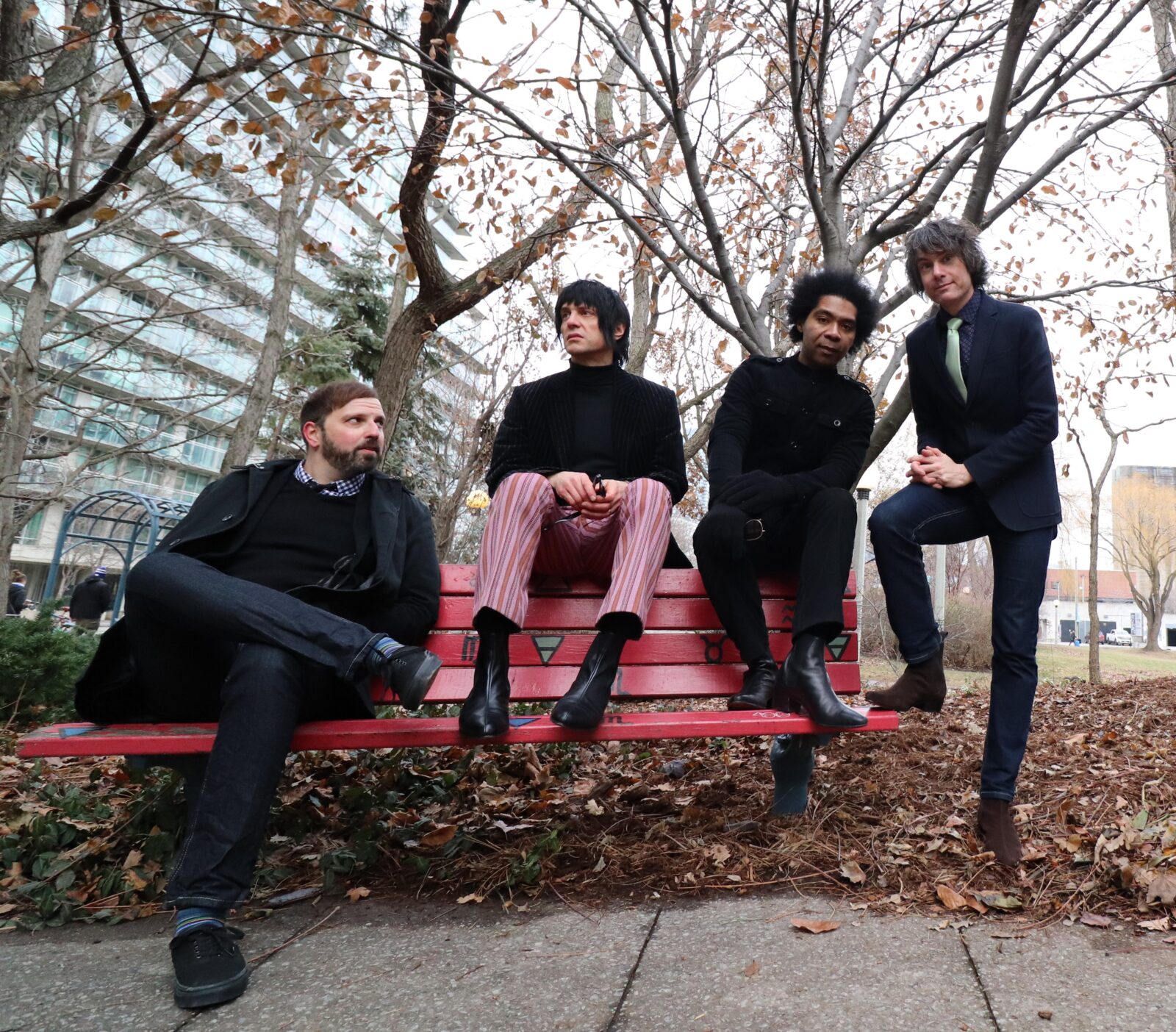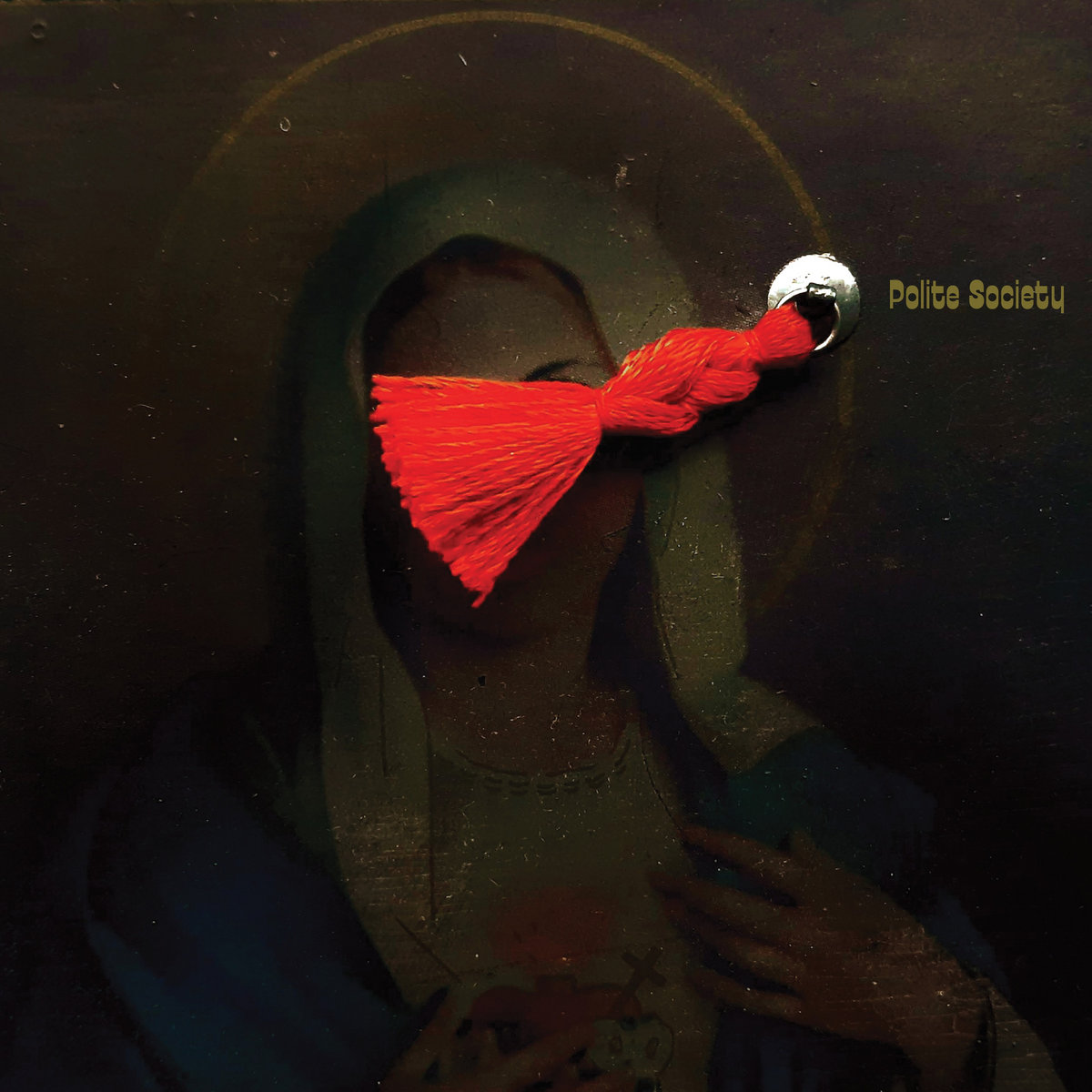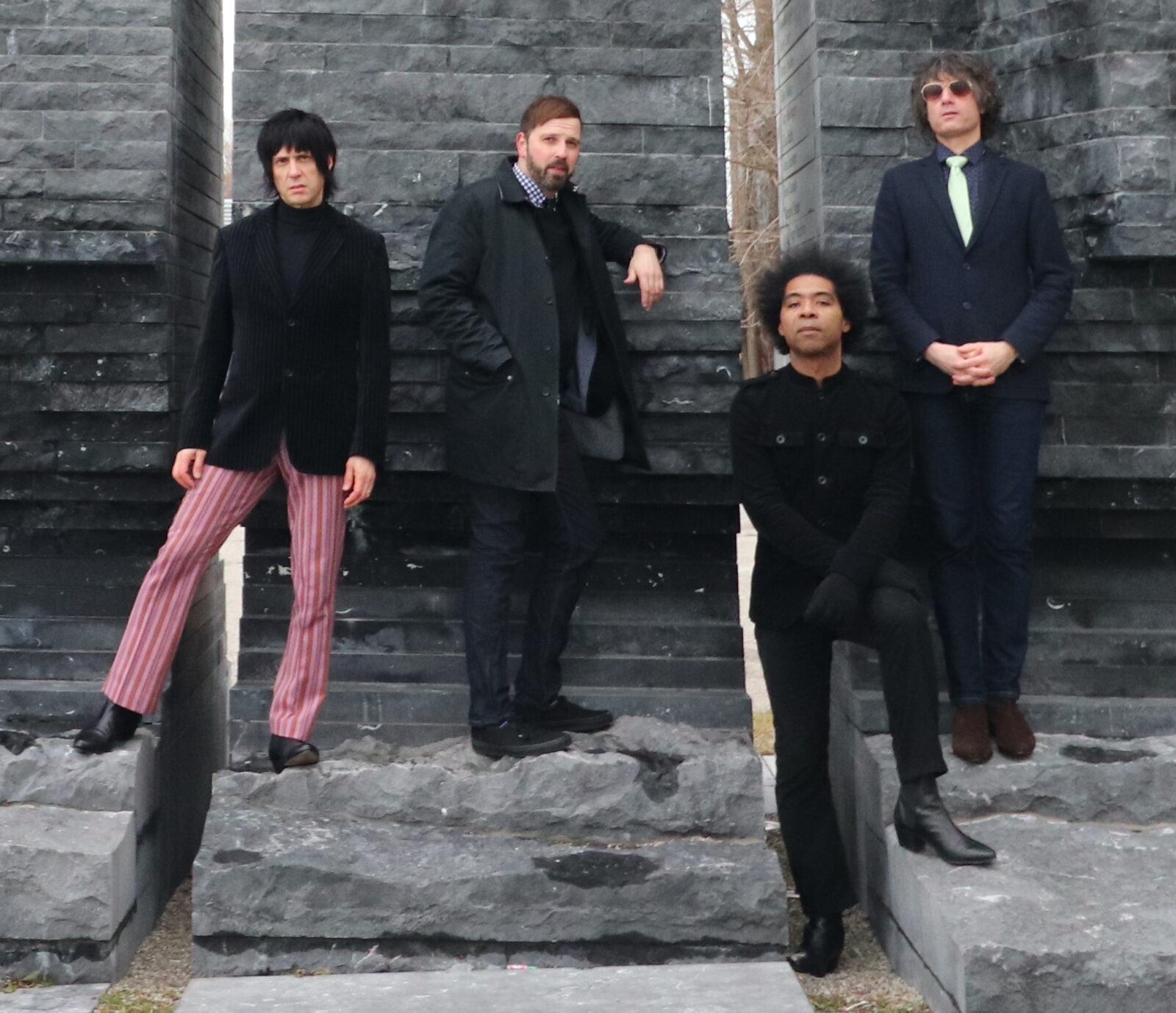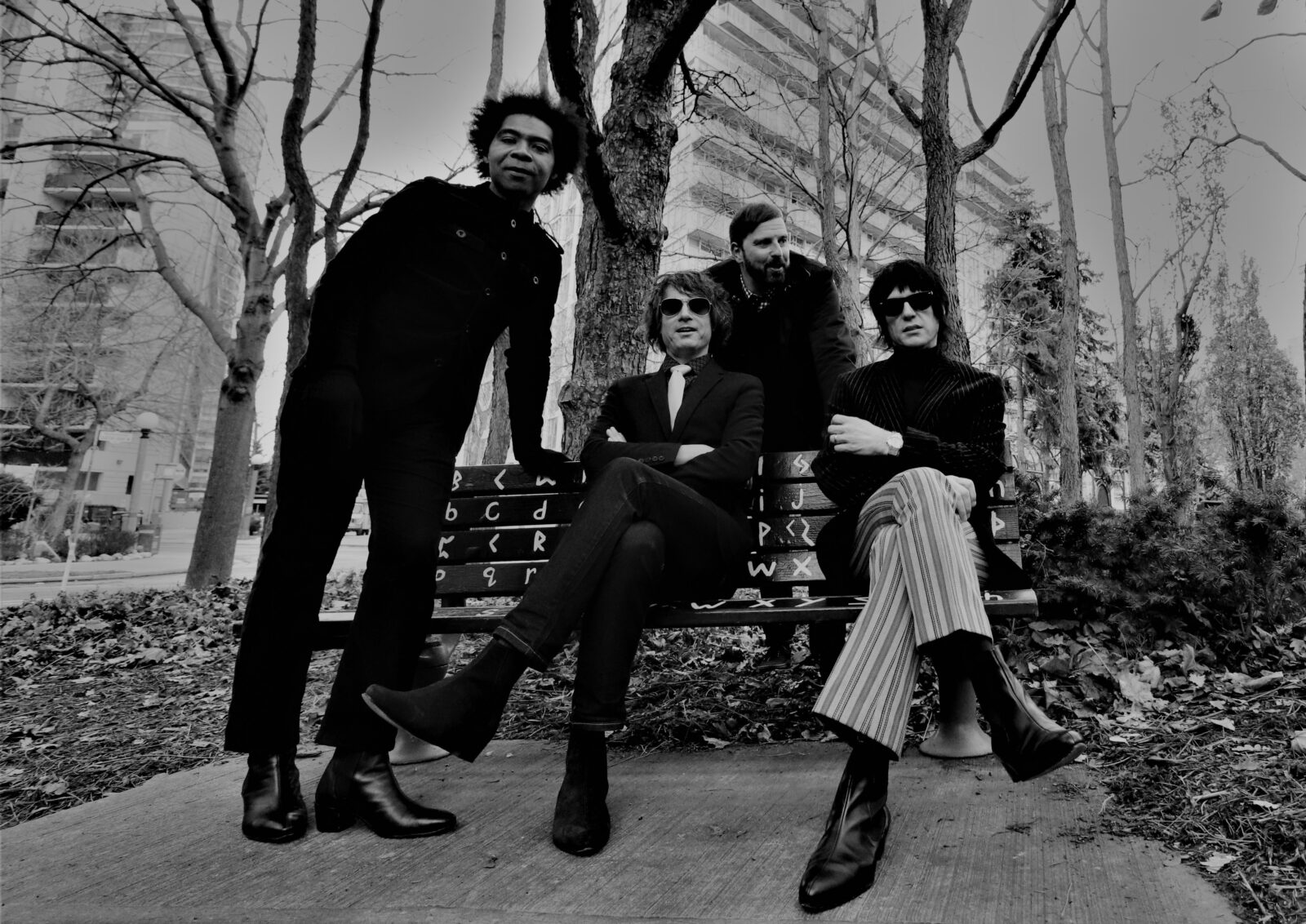Polite Society | Interview | “A luscious slab of late ’60s inspired psych”
Toronto-based Polite Society recently released a luscious slab of late ’60s inspired psych.
These four songwriters have crafted some wonderfully intricate psych rock classics. Limited to 250 copies on black vinyl with glossy gatefold sleeve and lyric sheet.

“We were fighting to make a record that sounded unlike anything that would be offensive to our ears”
Would you like to talk a bit about your background?
Jim Bravo: When we arrived from Ecuador in the 1970s, the sounds popular in Toronto’s inner-city were rock, disco, funk, reggae, punk and new wave. We were exposed to all of that by friends and neighbours. At home we had Salsa and Cumbia playing all of the time and what really inspired me to drum was the sound of any live drumming. With any act at trippy Ontario Place or Christie Pits I was always drawn to the drummer. I suppose a lot of children naturally are. Because kids are, or at least were allowed to roam, I’d position myself beside or behind them awestruck by both the sound and physical coordination. When Rap and then Hip-Hop came about, the simplicity and rawness of the beats went straight into me as well and I’ve carried that influence with me ever since.
How did the idea to start the band come to realization?
Jim Bravo: It started when Chris and I briefly performed in an act called The Phantastic Prayerbook. He and I are the constants in this whole saga. Besides playing some originals I’d written there was no clear mandate then. It was a depressing time when everything was up in the air. I’d reached the point where I became frustrated playing drums for others and wary of fronting another group as I had been doing in The Beethoven Frieze. Being one of very few black people in the scene, and with the prevailing attitudes toward that, was getting increasingly aggravating. This has persisted but today’s environment is slightly more bearable, I guess. In any case we eventually recruited some friends of ours and continued as The Hollow Earth. At that point it turned into an aggressive progressive psych-folk type of unit. I invited Paul to join at the tail end of that phase, and then James soon arrived on the scene with his torrent of demos. Once we got the deal to release this debut LP we seized the opportunity to change our name to Polite Society once and for all.
Today I was listening to your vinyl and I found it to be really well recorded, especially the drums which don’t have that typical “modern” sound that I’m not keen on. A peek into your creative process please, digital or analog?
Jim Bravo: None of us are keen on digital but that was how the LP was recorded. I despise endless multi-tracking. I would like to see us record onto 8-track, or if we have to go digital to at least impose limits. As decent as the record sounds I found there were few sonic benefits to it. The one section in ‘The Medusa Malfunction’, the backwards bit, being the only one I can think of. I suppose that digital gizmo saved what was a contentious part of the song. In any case Paul and James handled the bulk of the mixing, and I (with our friend Gene Hughes) handled the mixes for the closer on side 1 (‘Boats in a Dry Dock’) and the aforementioned ‘Medusa’ which opens side two. I am pleased with how the latter turned out and we promoted the LP with it straight out of the gate. With respect to the drum sound I may be the one who’s heard on the record but we all recognize that drums = soul and so a great deal of effort went into mixing those big old Ludwig’s, which really weren’t mic’d in an ideal or sympathetic way.

Paul Kehayas: We were fighting to make a record that sounded unlike anything that would be offensive to our ears and we worked bloody hard at it! We recorded it at various studios and although everyone was very nice and helpful at each, they weren’t getting us the sound we were looking for. In that instance it fell upon myself and James to mix the record with the majority of that burden falling on me. I needed to control it on the inside and not have to make justifications for why I wanted to do the things I wanted to do with the final product. I wanted to be able to hear everyone in the mix, especially the rhythm section as Chris and Jim are so fantastic together. I downplayed my guitar in favour of more keyboards as James’ lines were so integral that it was hard to push them down. It was a good exercise in atoning for past sins where I wanted my guitar up loud and overplaying in order to carry the musicality.
Chris Norman: I wish we could say there was a coherent creative process in the recording! It was all done at various venues as opportunities came up, somewhat on the cheap, and there were various mishaps along the way. We weren’t too crazy about how some of the tracks sounded initially. Early on I complained that everything sounded too 90s and suggested dumping the tracks we had and re-recording everything. If we managed to make it sound less modern, that’s indeed thanks to the mixing skills of those who put in a lot of hours to make it sound as good as it does. John McBain’s excellent mastering also played a big role.
This year under lockdown was pretty productive for you…
Jim Bravo: We were flying at half-mast like every other band but accomplished more than one would imagine a lockdown would have allowed. When you consider the feeling of hopelessness that was so overwhelming at the outset it’s a miracle, really. It, the lockdown, may have even benefited us in a way with people being stuck at home and constantly in need of new distractions. So we released the LP in July (2021) and we thought it would take months for radio or press to even notice it but the responses have been fairly immediate. With any luck our sophomore effort will find a spot in that dreaded vinyl factory queue for ’22. We have loads of demos in the well, and I’d like to release a single in the meantime. It’s only been a few months but already we’re getting an idea of what a single accessible track can do to spark overall intrigue.
It would be fantastic if you could venture back to the past and tell us about your previous activity and how that reflects your music in Polite Society?
Chris Norman: I was of course a member of our previous incarnation, Hollow Earth, going back to 2011. I’ve played for many years in a sort of jazz trio called Heavy Ethics, in which our keyboardist James plays the drums. The music we make in Heavy Ethics doesn’t have any influence on what we do in Polite Society, apart from the fact that I often find myself having to hold back from playing way too many notes.
Paul Kehayas: I was in a group out of Vancouver called John Ford that was set to become “the next big thing” (or so we were told) only to have it implode by way of our own hand, and a misunderstanding of our sound and direction. We had 4 writers who each sang and played each other’s songs…sound familiar? Well – nobody in the Canadian music world got it. At all! There was a great push to change the format and have just one guy and a backup group because that’s all they knew but we didn’t want to know. The four person singing/songwriting group is where I’m at my happiest – collaborating with people who are interested in seeing what happens with the chemistry available to them. It’s fun. Most of all, if you let it, the reward is that it will sound (in large part) like your group and hopefully no one else’s. Not having to try to make music designed to crack the Rock candy mountain is liberating. As Zappa said – “Kill Ugly Radio”.
Jim Bravo: It’s impossible to tell you precisely when it happened because it was too long ago, but it was love at first listen with psychedelia. From children’s programming, to literature, and fashion, remnants of psychedelia were still clearly evident in everything we were exposed to as kids in the 70s and early 80s so the impression it left was indelible. All of my musical activities have been informed by it for sure but then I’m largely concerned with all forms of escapism anyway. The main aspect of it which has carried over musically is a restrained type of meandering with an appreciation for memorable passages and strong melodies. One of the reasons I can abide our more indulgent tendencies is because I’ve played in similar enough groups in the past.
James Scott: I’ve been writing tunes since I was a tadpole. Chris and I have been playing and recording together in various projects since we were thirteen, doing all sorts of funny things informed by 60s and 70s rock. For instance, we once did an album in the guise of a French zeuhl band called ‘Le Chat’. Another time we formed a comedy combo named “The Blues Kings of Toronto” that wore Burger King crowns onstage, had terrible blues-based royalty pseudonyms and wrote songs pastiching the kinds of blues-based stuff you’d hear on the radio: swing blues, British blues rock, American 70s cock rock, prog blues, et cetera. We had one tune called ‘Zeppelin Apocalypse’ that had three Led Zeppelin chestnuts going at any one time. Ridiculous. In the early 2000s I was in White Van Speaker Scam. That band made some really interesting 60s influenced music through the prism of more current rock music. By the way, do guys in white vans still try to sell people speakers in mall parking lots? I hope so. Anyway, I think a love for 60s and 70s music and generally trying to have fun creatively pushing some limits have been the through line to my involvement in Polite Society. It’s great to write and work with these guys. I think we’ve got a bit of a special thing happening.
Are any of you involved in any other bands or do you have any active side-projects going on at this point?
Paul Kehayas: Nothing at the moment, but there are always people I wish to play with. I feel quite satisfied playing with this lot.
James Scott: So many. Too many! I play keyboards all the time at home, and use them incessantly as a writing tool…but as a live performer and working musician, until recently I was most likely to be found behind the drum kit. Chris and I are the rhythm section in a creative jazz/prog trio named Heavy Ethics. We share composing duties with our pal Rommel Reyes, a fantastic Toronto pianist/composer. We’ve got an album in the can I hope we’ll put out sooner than later. That band’s been going for over 20 years, which is odd as I’m only 27. Ha! Kidding! Chris and I (along with Lammping bassist Scott Hannigan) have a project specializing in Jack Bruce and Cream tunes called Strange Brood.
Jim Bravo: Apart from an ambition to finally get Plumes De Ma Tante off the ground, which would be a band performing covers of eerie French ballads, I have none.
What’s the “alternative” scene in Ontario?
Jim Bravo: Furries because all Canadians are sex-starved freaks who live in igloos. In all seriousness I would have said Hip Hop many years ago, but because Hip Hop is SO huge these days I would now say that Rock and Reggae are once again the alternatives. The culture for each revolves around DJs who hold their monthly/weekly events and breathe life into largely unknown records much like they’ve always done.
“Each song is a spitting sonic image of its writer”
The record is true psych rock! It could have been released in 1968 without sounding out of time. It’s like a time capsule. Would you like to share some further words about the songs on the LP?
Jim Bravo: Well they come from bodies and minds that were born right around the corner from that year. One thing for certain is that each song is a spitting sonic image of its writer. There are four very distinct personalities in this band. That works both for and against us but it at least made for an interesting album in this case. It’s interesting to try and envision hearing it for the first time. I find myself revisiting some songs after someone says “Hey I really like this particular one” and then I engage in a mostly futile attempt at virgin-eared scrutiny. As an artist I suppose there are things I would change about all of them given the chance but for the purposes of this record I suppose each are as they were meant to be. I was worried there would be some that would stand out for all of the wrong reasons, the also-ran and filler syndrome et cetera. I suppose that is always the risk with a full length, especially a debut. Thankfully the general view is that it does play like one work as opposed to a collection of disparate contributions. Perhaps our next one will convey the latter feeling in some crazy way.
Let’s end this interview with some of your favourite albums. Have you found something new lately you would like to recommend to our readers?
Jim Bravo: I heard ‘Evolution’ by The Picture recently and it has to be one of the most sublime psych tracks ever committed to tape. Not new, but I’ll never fail to recommend ‘My Ancestors’ by Chris Zebby Tembo & Ngozi Family. As a black fellow in rock I feel a solid kinship with it. Elmer Gantry’s Velvet Opera is indeed exhilarating stuff. They’re sort of like superbitch Dandies among the psych set. ‘We Are Everything You See’ by Locomotive UK may be familiar to some but worth the mention because the drumming on that is perfect. ‘Stick A Bush’ by The Gladiators is a must. Like the brief collision point of reggae and new wave. A compilation of Soul rarities called ‘The Other Side Of Sun’ (Records) is new to me and very cool. On the more known side of Soul I’m loving ‘Got To Have You Back’ by Isley Brothers. It’s a beautiful and faintly Indian inspired track. Very unique. Lastly, it makes me extremely proud to be the first person in history to recommend ‘Chansons Et Légendes Pour Demain’ by Julietta. It’s a science fiction psych-tinged LP in the vein of Julian’s Treatment and I believe it’s from 1972. I found it in a dollar crate about 6 years ago and I’ve yet to come across anyone who’s heard of it.
Chris Norman: I don’t really get the concept of favourites. In the last couple of days I’ve been listening to Michael Tippett’s 2nd and 4th symphonies, the Beach Boys’ recent ‘Feel Flows’ box set, Earth, Wind and Fire, ‘Restless Night’ by Octopus, ‘Idiom’ by Anna Webber, various Deerhoof albums and a hundred other things.
Paul Kehayas: To be honest I am certain that I have much to learn about music in general. When push comes to shove I believe that it is such a personal an issue that I have a hard time recommending music for people to listen to. Really it’s just a matter of not listening to the same old thing – and I really hope that we don’t sound like that. But seeing as how you asked, here are a few on the turntable as of recent that I consider music of indispensable worth. Under “new” I really like a group that isn’t psychedelic, just plain great, and this would be Fontaines DC. I’ve been to the place where they used to hang out (the now sadly defunct Garage Bar in Dublin – best music club in the world it was!). I love their take on the whole post punk sound. Absolutely killer lyrics. They have two LP’s out and I recommend them both. Under “old” I would say that this year has been an exercise in ruining my bank account with all the Blue Note Records reissues released under the 80th Anniversary, Classic Jazz Series, or the Tone Poet editions. Seriously, there are now two new squares on the record shelf where there were none before. Of rock and roll and psych I have too much to mention and so little desire to so I’ll leave that to others. However!…Beatles, Van der Graaf, Stones, King Crimson, et cetera.
James Scott: Oh my. I don’t think I have the hubris to be able to tell someone to listen to something I like unless I already know their taste. Let me just list a bunch of stuff until I stop. I’m not sure how many of your readers will care about this…. Most of my home listening is to classical music and jazz. Over the last couple of years, I’ve fallen in love with the symphonies of Martinu. His sound world is something very special. I’m a sucker for early 20th century French stuff: Debussy, Ravel, Roussel, Poulenc…. I just discovered a guy named Jean Cras, who wrote some lovely chamber music. But, once the wine comes out, there’s nothing I like to put on more than late 60s British psych. Those compilations Grapefruit has been putting out over the last few years have been a great resource for my Friday nights. I love the sunshine pop comps that Teensville’s been putting out too. I spent the early 90s listening to 60s rock, and the late 90s to prog and jazz-fusion classics, so all of that wonderful music will always have a special place in my heart. As far as new stuff goes, I like Needlepoint, triumphant messengers of Norwegian psych-jazz-prog. Steve Coleman’s recent Village Vanguard album was a real ear opener. I was addicted to it for a while. And I try to listen to any album Dan Weiss plays drums on. Maybe one day I’ll be 1% of the drummer he is.

Thank you. Last word is yours.
Jim Bravo: We get a lot of mystified questions about it, so the final word has to be on the album’s artwork. It centers around a bizarre 50s era devotional jewelry box I found at a flea market many years ago. It was months before I realized it was also a music box that plays a warped and disturbing Swan Lake. Up until then I would hear random disembodied chimes whenever the trams rumbled past and wonder where the Hell they were coming from. Those freakish images of Mary are the product of a fortunate accident. The box had been jammed shut for eons and after I took it home and pried it open I lifted the red tassel from her face to find that the brow area had been sheltered from any aging-related darkening. It is by pure chance that the tassel fell where her eyes are situated, creating that striking reveal effect. See you all in Europe!
Klemen Breznikar
Headline photo: Brandy J. Burdeniuk
Polite Society Facebook / Instagram / Bandcamp / Spotify/ Apple Music / YouTube
Spiral Void Facebook / Bigcartel




